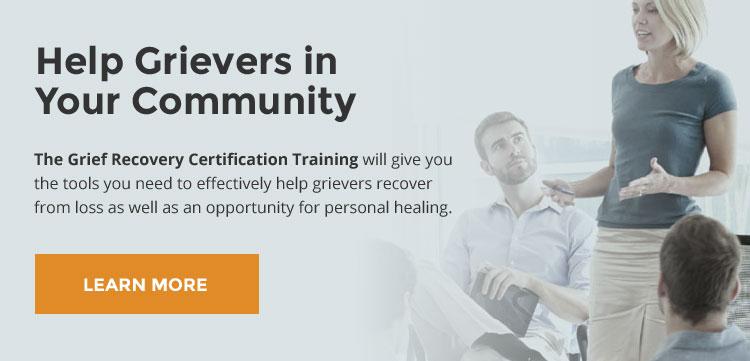Religious organizations of all denominations are in the forefront of helping grievers deal with the impact of death, as well as divorce and other losses. Some have informal support programs that provide either short- or long-term support; while others offer specific, recovery-based actions to help their flocks.
We are proud that the Grief Recovery Method is the centerpiece of recovery programs in hundreds of churches, synagogues, and other houses of worship throughout the United States and the world.
In conversations with many members of the clergy, and with even more staff and volunteers connected to religious organizations, they tell us the Grief Recovery Method Certification training has helped them guide their grieving parishioners in overcoming many of the conflicting feelings caused by their losses.
Here are five positive benefits of adding the Grief Recovery Certification specialization in your church community.
1. A return to a sense of trust in God when a griever has felt a breach of faith as the result of an overwhelming loss. This also can apply their loss of trust in the clergy and other members of the church.
Some losses are so impossible to comprehend—so out of the normal order of things—that grievers often find themselves losing faith and trust in God, and with the people in their religious community.
2. Completing underlying grief, as well as the presenting loss issue, helps people see themselves more honestly, leading to enhanced religious and spiritual participation in their lives.
The baggage of the past tends to clog our vision of ourselves and others. The freedom to see events and feelings as they really were—though sometimes painful—opens the pathway to emotional completion.
3. In a crisis we go back to old beliefs and old behavior. Effective Grief Recovery makes return to new beliefs and new behavior possible, and improves religious and spiritual connections.
For many people whose faith had been compromised earlier in life, but who came back to the fold, a new loss can take them back to old ways. Grief Recovery can help them regain and sustain their hard-won religious and spiritual beliefs.
4. Dealing effectively with past grief allows parishioners to re-build a sense of trust in God, themselves, and others.
Losses of trust, safety, and control are some of the major by-products of unresolved grief. Since those losses don’t repair themselves, it’s important to take the actions that help restore what has been lost.
5. Completion of old relationships can strengthen or restore religious beliefs that can be a source of great comfort at a critical time, and ensure that grievers don’t sabotage future relationships.
Sadly, many parishioners who don’t deal effectively with their grief, don’t return to church after a major loss. Grief Recovery helps them be much better prepared to deal with life’s inevitable losses when they happen.
A Grief Recovery Method—A Great Source of Comfort and Guidance
Since everyone experiences losses of varying kinds and emotional intensity, grief is a universal topic with which everyone can identify.
Clergy and church personnel who have been trained in the Grief Recovery Method can take their parishioners through the actions of Grief Recovery, which can help repair any damage to their faith or beliefs or faith, or can strengthen existing bonds.
Some people may think we believe that Grief Recovery is the be-all, end-all answer to everything, but that’s not the way we see it. We believe that dealing effectively with grief is the best new beginning you can give your congregation.

























Add new comment